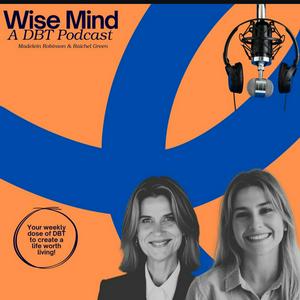In this episode of Wise Mind- A DBT Podcast, we introduce the very first Distress Tolerance skill in Dialectical Behavior Therapy (DBT): the STOP skill — a powerful tool for those moments when your automatic responses take the wheel and your frontal cortex basically says, “See ya!” Whether you’re overwhelmed, panicked, angry, or just about to spiral, this skill invites you to create space between a trigger and a reaction — and choose to respond with intention, rather than react from an old story.We explore how recognising and expanding that space can actually begin to rewire your brain. Through regular practice of STOP, you start forming new neural pathways, increasing your capacity to respond skillfully rather than impulsively. Raich beautifully captures this idea with Viktor Frankl’s words: “Between stimulus and response there is a space. In that space lies our freedom and power to choose our response. In our response lies our growth and freedom.”We also unpack how STOP skill acts as a link to other skills. Plus, you'll hear honest stories from your hosts, Maddy and Raich, who share how this skill has helped them in grenade throwing moments.But we don’t STOP there. Maddy takes us into the science of grounding, explaining how it works in the brain and body when your nervous system is overwhelmed. We look at the wonderful and wondrous role of the vagus nerve, and how grounding can bring your system back online when you’re feeling disconnected or dysregulated.To make these skills tangible, we guide you through two practical grounding exercises, engaging your senses.Recommendations & Links to Our Resources: STOP Skill Handout https://drive.google.com/file/d/1zPnep6wNX5Y2QmFgo7Gxm5rRlElWDXPv/view?usp=sharingSTOP Skill (Wallet size) https://drive.google.com/file/d/1ukE5A7oqObq84n240SO6bfPDYvwNVXQH/view?usp=sharingGrounding Skill Ideas (Therapist Aid) https://www.therapistaid.com/worksheets/grounding-techniquesGrounding Practice 5,4,3,2,1- Youtube (Lewis Psycology)5-4-3-2-1 Grounding Method: 5 Senses Grounding Exercise To Manage AnxietyHeadspace App- (Engage Your Senses)Mental Wellness App: Meditation & Sleep - HeadspaceWork With UsWe’d love to connect with you! Whether you have questions, feedback, collaboration ideas, or just want to say hello — reach out to us at:
[email protected]To learn more about our clinical work or book a session, visit:🔗 Raichel Green Counselling www.raichelgreencounselling.com📸 Madelein Robinson on Wise Mind- A DBT Podcast Instagram: @wiseminddbtpodcastStay tuned for the launch of The Wise Mind Collective — website - Coming soon!Music“Note to Daisy” by the incredibly talented Micah Polla🎧 Listen on SpotifyAcknowledgement of CountryWe acknowledge the Darkinjung people as the Traditional Custodians of the land on which we record, share, and connect here on the Central Coast. We pay our deepest respects to Elders past , present and emerging, and extend that respect to all First Nations peoples joining us today.Crisis SupportThis space may include discussions that bring up strong emotions or difficult topics. If you’re feeling overwhelmed, please know you're not alone and support is available.If you or someone you know is in crisis, we encourage you to reach out to:Lifeline – 13 11 14 (24/7)Beyond Blue – 1300 22 463613YARN – 13 92 76 (A 24/7 national support line for Aboriginal and Torres Strait Islander people)Emergency Services – 000 (if you are in immediate danger)Acknowledgment of Dr. Marsha M. Linehan and the Origins of DBTWe honor Dr. Marsha M. Linehan— psychologist and professor who created Dialectical Behavior Therapy. It’s thanks to Dr. Linehan that DBT has become a proven intervention for a range of mental health challenges. Wise Mind A DBT Podcast gratefully acknowledges that DBT is Dr. Linehan’s work—not ours—and we honor her legacy.


